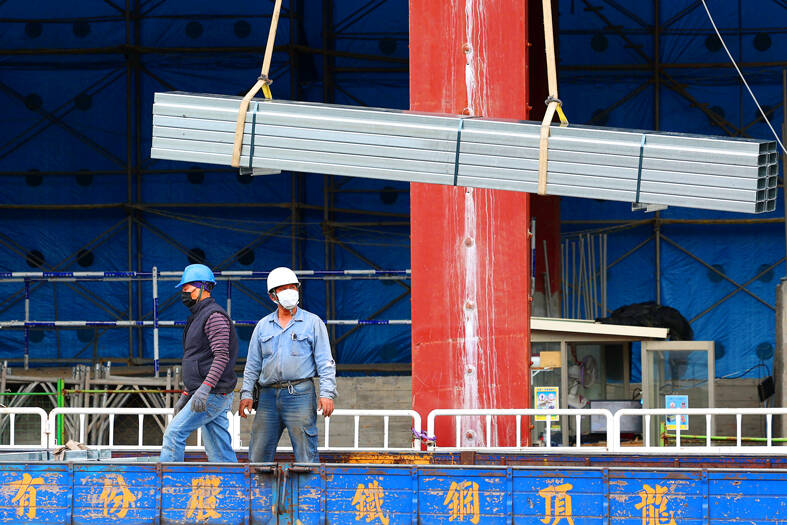Cathay Financial Holding Co (國泰金控) yesterday downgraded its GDP growth forecast for Taiwan for this year to 3.0 percent, from its previous estimate of 3.2 percent, and lowered its forecast to 2.3 percent for next year, down from 2.7 percent, citing slowing export and investment growth.
Other factors that could also weigh on the nation’s growth outlook include Russia’s invasion of Ukraine, China’s COVID-19 situation and inflation in the US and Europe, Cathay Financial Holding said.
Since the global economy is expected to slow next year, demand for manufactured goods from Taiwan might weaken, which would add to the pressure on electronics manufacturers facing inventory congestion and dampen exports momentum, said National Central University economics professor Hsu Chih-chiang (徐之強), who heads a research team commissioned by Cathay Financial Holding.

Photo: CNA
As companies become more conservative about exports and economic growth, they might refrain from expanding or making large-scale investments next year to avoid affecting the scale of private investment, Hsu said.
On a positive note, private consumption might contribute to the economy next year due to increased purchasing and relaxed border controls, he said.
In addition, growth momentum in the second half of next year might be stronger than in the first half, as firms are likely to have depleted their inventories by then, Hsu said.
Cathay Financial Holding’s 2.3 percent GDP growth forecast is lower than the 2.53 percent estimate by the central bank and the 2.75 percent that the Directorate-General of Budget, Accounting and Statistics predicted.
Inflation in Taiwan is expected to peak at about 2.0 percent at the end of first quarter next year and the central bank could stop its rate hikes in the first half of the year, Hsu said.
There is a slim chance that the central bank would lower its policy rates next year, he said.
The policy rates are still at a comparatively low level given the central bank’s mild pace of hikes this year, he added.

South Korea’s equity benchmark yesterday crossed a new milestone just a month after surpassing the once-unthinkable 5,000 mark as surging global memory demand powers the country’s biggest chipmakers. The KOSPI advanced as much as 2.6 percent to a record 6,123, with Samsung Electronics Co and SK Hynix Inc each gaining more than 2 percent. With the benchmark now up 45 percent this year, South Korea’s stock market capitalization has also moved past France’s, following last month’s overtaking of Germany’s. Long overlooked by foreign funds, despite being undervalued, South Korean stocks have now emerged as clear winners in the global market. The so-called “artificial intelligence

NEW IDENTITY: Known for its software, India has expanded into hardware, with its semiconductor industry growing from US$38bn in 2023 to US$45bn to US$50bn India on Saturday inaugurated its first semiconductor assembly and test facility, a milestone in the government’s push to reduce dependence on foreign chipmakers and stake a claim in a sector dominated by China. Indian Prime Minister Narendra Modi opened US firm Micron Technology Inc’s semiconductor assembly, test and packaging unit in his home state of Gujarat, hailing the “dawn of a new era” for India’s technology ambitions. “When young Indians look back in the future, they will see this decade as the turning point in our tech future,” Modi told the event, which was broadcast on his YouTube channel. The plant would convert

‘SEISMIC SHIFT’: The researcher forecast there would be about 1.1 billion mobile shipments this year, down from 1.26 billion the prior year and erasing years of gains The global smartphone market is expected to contract 12.9 percent this year due to the unprecedented memorychip shortage, marking “a crisis like no other,” researcher International Data Corp (IDC) said. The new forecast, a dramatic revision down from earlier estimates, gives the latest accounting of the ongoing memory crunch that is affecting every corner of the electronics industry. The demand for advanced memory to power artificial intelligence (AI) tasks has drained global supply until well into next year and jeopardizes the business model of many smartphone makers. IDC forecast about 1.1 billion mobile shipments this year, down from 1.26 billion the prior

People stand in a Pokemon store in Tokyo on Thursday. One of the world highest-grossing franchises is celebrated its 30th anniversary yesterday.